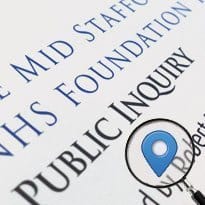Health secretary Jeremy Hunt has confirmed that an ‘Ofsted style’ system of summary ratings for hospitals and care homes will be adopted by the NHS.
The decision, which goes against the spirit of advice from the Nuffield Trust that Hunt asked the think-tank to produce, forms part of the government’s response to Robert Francis QC’s final report into the scandal at Mid Staffordshire NHS Foundation Trust.
Hunt asked the Nuffield Trust to investigate whether an ‘Ofsted-style’ report system could and should be introduced to the NHS.
The think-thank concluded in a report last week that this might work for “simpler” services such as care homes and GP practices, but not for complex organisations such as hospitals.
It also warned that any new ratings would need to be carefully aligned with NHS performance and regulatory regimes.
Despite this, the government says it will push ahead with the idea for hospitals and care homes, but not GP practices, for which it argues more choice and quality information is already available.
In a nod towards the Nuffield Trust’s concerns, it says that departmental ratings will also be developed.
However, another part of its response to Francis says that ‘fundamental standards’ will also be developed for the NHS, and that these will be subject to their own inspection and failure regime.
This may create scope for confusion about what is being judged by the different systems, and which regulators get priority.
At a press conference this morning, Jeremy Hunt said he understood that there were differences between schools and hospitals, but that “it will be a system with agreed definitions of what is needed to make a good hospital.”
Francis published his report into why high death rates and very poor care persisted at Stafford Hospital between 2005 and 2008 in February.
In its response, titled ‘Patients First and Foremost’, senior Department of Health figures apologise for the failings, before going on to accept most of Francis’ recommendations.
The response argues that action is needed at patient, staff, management and regulatory level to create a new culture of “safety, compassion and learning that is based on cooperation and openness”.
As part of this, it confirms weekend leaks that legal action may be taken against organisations that “deliberately” issue false or misleading information.
Hunt said the Nuffield Trust will be asked to do further work on Ofsted-style ratings.
At the same time, the response outlines a new regulatory regime for providers, which will be headed by a new position of chief inspector of hospitals.
The chief inspector will support the Care Quality Commission, which will go back to its role as a quality inspector, with new ‘expert’ inspectors to physically inspect hospitals.
The response says that the CQC, Monitor and other bodies will agree a “single measure of success” for providers, which the chief inspector of hospitals, the CQC and new quality surveillance groups will oversee.
Monitor and the NHS Trust Development Authority will take action on any problems uncovered.
In response to the government’s plans, Nuffield Trust chief executive Dr Jennifer Dixon said there was a clear need to address a gap in information for the public about the quality of health and social care.
However, she added: "It will be a more complex challenge to introduce a single summary score for hospitals as Ofsted does for schools" and "rating individual wards, departments and clinical services is likely to be of more value to patients."
Dr Mark Porter, chair of BMA Council, said that while information for patients was important “it is impossible to reduce everything [healthcare providers] do to a meaningful score.”
He also warned there was a danger of the new regime encouraging managers to “focus unduly on ratings.”
The government will conduct further consultations on all of the recommendations in the Francis report over the coming months.

